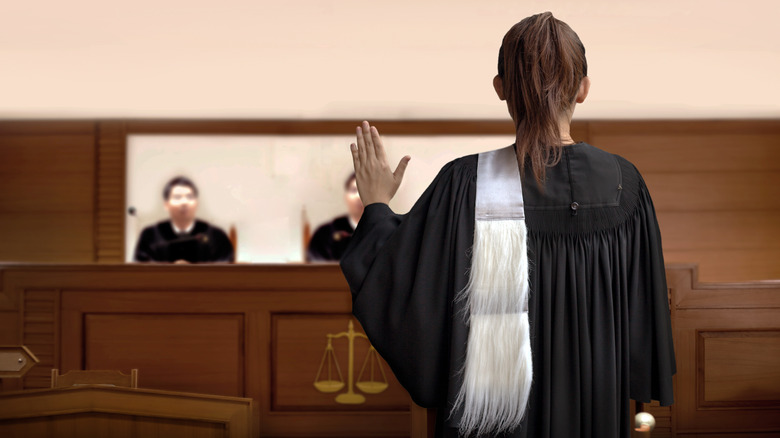Why Tucson, Arizona Held A Witchcraft Trial In The 1970s
The first large-scale witch trials in Europe began in France and Switzerland in the 15th century before spreading across the continent, according to History. Over the course of the next few hundred years, thousands of women were accused of witchcraft before the panic made landfall in the American colonies across the Atlantic ocean. Perhaps the most famous of these trials in the U.S. were the Salem witch trials. Beginning in 1692 in the village of Salem, Massachusetts, the event resulted in the deaths of roughly 25 women and men before it concluded the following year, per NPR.
One might imagine that all that died out by the 20th century. But incredibly, this isn't exactly the case. It seems that in 1970, hundreds of years after Salem, a woman in Arizona lost her job — and was even tried — over accusations of witchcraft.
Per The Tuscaloosa News, a folklorist and academic named Dr. Byrd Granger spoke to high school students in a town near Tucson in 1969. The subject of Granger's talk was the history and nature of witchcraft in literature and in folklore. During the presentation, Granger described traits traditionally attributed to the physical appearance of a witch — among which included a hairline commonly referred to as a "widow's peak," a tendency to wear certain shades of clothing, and having green or blue eyes. Little did Granger know her description fit someone these students knew: an English teacher who worked at the school named Ann Stewart. And as is often the case, those students began to talk.
Was Ann Stewart a real witch?
Following Dr. Byrd Granger's presentation, a number of students enrolled in Ann Stewart's English classes at their Arizona high school began to inquire if Stewart might, in fact, be a witch, as The Tuscaloosa News reported in 1971. Like any good teacher, Stewart neither confirmed nor denied if this was the case — initially taking the question as an example of teenage hijinks. But after the question was initially posed, she realized it presented an opportunity for her students to explore their interest in witchcraft and the ways it tied into subjects like history and literature.
At the time, Stewart said the idea was to primarily "get kids involved." Speaking to The Tuscaloosa News, she explained," I teach American literature, among other things. Although I've never had a unit in the occult, we do delve into early American folklore and witchcraft. It was good fun and it stimulated them."
Over time, Stewart's support for her students' interest in witchcraft and the occult turned to astrology. By the following year, the word was out among incoming students at Flowing Wells High School that their literature teacher was a real witch — even if that wasn't the case. Little is known about how the students really felt about this claim. What is known, though, is that their conservative parents were unamused, per History Collection.
Ann Stewart lost her job following accusations of witchcraft
Compared to the fate of accused witches before her, the outcome of Ann Stewart's witch trial was somewhat tame (via History). According to a 1971 piece by The New York Times, Stewart was handed a suspension from Arizona's Flowing Wells school district at the end of that year, for both teaching about witchcraft and for being a witch — even if the latter wasn't exactly the case.
According to The New York Times, Stewart's cause for dismissal was "teaching about witchcraft," "[having] stated that you are a witch," "causing mental stress for many teachers," and "discussing things not in the curriculum to the detriment of curriculum materials." Stewart was also said to be a poor influence on students and an insubordinate employee. Subsequently, Stewart's sudden firing over witchcraft was found to be in violation of her contract as a tenured teacher, and she was to be reinstated under court orders. Despite the ruling, this was never put in place, and Stewart struggled to find work in the aftermath. (As of this writing, it's unknown if Ann Stewart ever taught again.)
Per The Tuscaloosa News, Stewart ascribed what happened as a personality conflict with her supervisors more than as based on a real accusation of witchcraft. But according to the paper, her husband, William Stewart, felt his wife was indeed gifted with extrasensory perception (otherwise known as ESP). In the end, perhaps there was some truth to the rumor after all.


